Shanghai strives for high-quality development of AI industry
In China's National and Local Co-built Humanoid Robotics Innovation Center in Zhangjiang High-tech Park, Shanghai, a remarkable full-sized general-purpose humanoid robot named "Healthy Loong" has attracted wide attention.
The 1.85-meter robot with 43 spherical joints can engage in fast walking, swiftly avoid obstacles, steadily mount up and down slopes, and resist impact interference.

Visitors interact with robotic dogs at the 10th China (Shanghai) International Technology Fair, June 13, 2024. (People's Daily Online/Bao Gansheng)
So far, many prototypes of general-purpose humanoid robots have been launched in Shanghai.
In recent years, Shanghai has been exploring effective pathways with a reform-minded approach to accelerate the convergence of key artificial intelligence (AI) elements in order to build a high ground for AI development.
The city has been improving coordination mechanisms to address challenges in industrial development. "Innovation in AI requires us to stimulate reform vitality and provide more policy services," said Zhang Ying, head of the Shanghai Municipal Commission of Economy and Informatization.
In October 2022, Shanghai implemented a local regulation on boosting the development of the AI industry, followed by policies and measures to advance the unified scheduling of computing resources, new infrastructure construction, and large model innovation.
The city is advancing multiple plans to support model innovation, accelerate the development of intelligent computing, and promote demonstration applications.

Photo shows the Shanghai AI Tower in Xuhui district. (People's Daily Online/Wang Chu)
It is also working to establish a center for large model testing, verification, and collaborative innovation, an alliance for corpus data, platforms for intelligent computing scheduling, centers for hardware-software compatibility evaluation, and open-source communities for large models.
Shanghai's Pudong New Area is promoting the development of companies focused on intelligent computing chips and humanoid robots, while the Xuhui district is fostering cluster innovation of algorithm enterprises, especially in large models. The city has also built large-scale intelligent computing clusters, primarily deployed in Songjiang district and Lingang new area, to support large model training.
Shanghai has formed a "4+X" cluster pattern, centered on the Zhangjiang AI Island in Pudong, the Shanghai AI Tower in Xuhui, the Dishui Lake AI Innovation Hub in Lingang, and the Maqiao AI Innovation Experimental Zone in Minhang district.
With an eye on both the present and future, Shanghai is rapidly building an open, secure, and vibrant innovation ecosystem. The city is creating a software-hardware compatibility and testing system, supporting the Shanghai AI Laboratory in establishing deeply linked software-hardware compatibility solutions, and promoting cooperation between the laboratory and companies like INESA (Group) Co., Ltd. to provide a basis for chip selection for the construction of the intelligent computing center.
Shanghai has also established an innovation center for humanoid robot manufacturing to accelerate industrial chain integration, create a humanoid robot industrial base, reduce algorithmic innovation costs for enterprises, and promote the standardization of components. The city is building a multi-level talent system and has established the Artificial Intelligence Strategy Advisory Expert Committee to provide talent and intellectual support for the development of the AI industry.

Photo shows "Healthy Loong," a full-sized general-purpose humanoid robot. (Photo/Fang Zhuoran)
AI technologies are being rapidly adopted across various sectors, demonstrating significant growth and potential.
SenseTime, a Chinese artificial intelligence pioneer, has launched an enterprise-level large model integrated machine that can simultaneously support enterprise-level 100-billion-parameter model acceleration and knowledge retrieval hardware acceleration, saving 80 percent of costs compared to similar products.
Shanghai-based AI company Intsig is contributing to the protection of traditional Chinese culture by using generative AI technology to restore pages and text of the Dunhuang manuscripts, a wide variety of documents in Chinese and other languages that were discovered at the Mogao Grottoes in Dunhuang, northwest China's Gansu province.
Shanghai General Hospital is applying Alipay's "AI medical assistant" solution to provide patients with a voice-interactive "AI Doctor." The SMC Shanghai Foundation Model Innovation Center, one of China's first dedicated incubators and accelerators for large-scale AI models, has already attracted over 80 large model enterprises.
From 2018 to 2023, the number of AI enterprises above the designated size in Shanghai increased from 183 to 348, with the industry value surging from 134 billion yuan ($18.44 billion) to over 380 billion yuan. The city is now home to over 100 large model enterprises, with 34 large models having passed filing procedures.
Photos
Related Stories
- 2024 World AI Conference: Governing AI for Good and for All
- China showcases AI prowess at 2024 WAIC, with 24 AI projects signed
- China spearheads collaborative, inclusive agenda for global AI governance
- AI-powered robots showcased during 2024 World AI Conference in Shanghai
- BRI countries go smarter with China's AI ingenuity
Copyright © 2024 People's Daily Online. All Rights Reserved.









